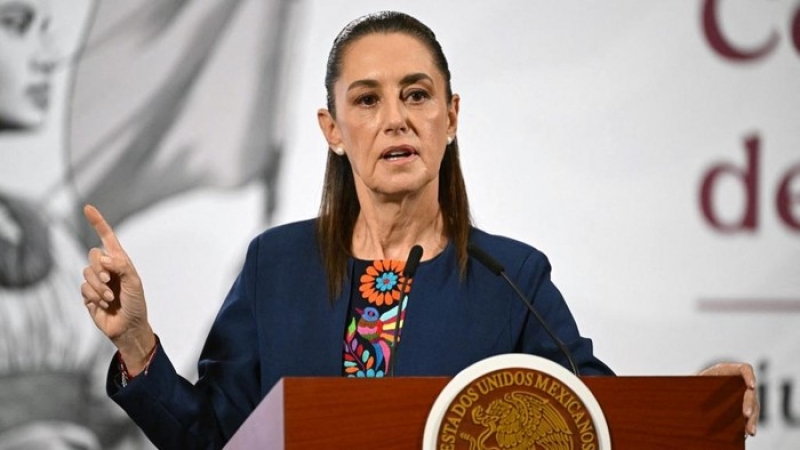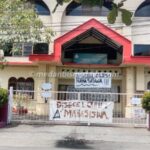Mexico City – Mexican President Claudia Sheinbaum strongly rejected threats made by US President Donald Trump against her country to stop drug trafficking by local cartels. Sheinbaum emphasized that US attacks on Mexican territory will not happen.
“That will not happen,” stated Sheinbaum in a recent press conference.
This statement was made by Sheinbaum in response to Trump’s latest warning, in which he said he would do “whatever we have to do,” including attacks on Mexican territory, which is an economic partner and key US ally.
“We do not want intervention by any foreign government. There is cooperation and there is coordination, but not subordination,” she said.
Referring to the 19th century war, Sheinbaum stated that “the last time the United States came to intervene in Mexico, they seized half of its territory.”
“We cannot allow intervention,” she emphasized again.
The threat of attacks against Mexico was made by Trump when speaking to journalists. The US President said he would authorize attacks against Mexico if deemed necessary.
“Would I launch attacks in Mexico to stop drugs? I have no problem with that. Whatever we have to do to stop drugs,” he said.
“I’m not saying I would do it, but I would be proud to do it. Because we would save millions of lives by doing so,” said Trump.
This statement was made by Trump as the US deployed aircraft carriers and other important military assets near Venezuela to pressure President Nicolas Maduro, who the US accuses of being a drug cartel leader. Maduro strongly denies these accusations.
US military forces have blown up more than 20 vessels suspected of drug smuggling, resulting in at least 83 deaths total. So far, no evidence has been presented to support the Pentagon’s claim that the vessels attacked in the Caribbean and off the Pacific coast were smuggling drugs and threatening the US.
Mexico City
Mexico City is the vibrant capital of Mexico, built upon the ruins of the Aztec capital of Tenochtitlan, which was conquered by the Spanish in the 16th century. This rich, layered history is visible in its historic center, a UNESCO World Heritage site, where ancient Aztec temples stand near colonial-era cathedrals and palaces. Today, it is a vast, modern metropolis renowned for its art, cuisine, and bustling urban life.
United States
The United States is a North American nation founded in 1776 after declaring independence from Great Britain. It grew from thirteen original colonies into a global superpower, shaped by waves of immigration, a civil war, and a democratic constitution. Its diverse culture is a product of its history as a land of indigenous peoples, European settlers, and enslaved Africans.
Mexico
Mexico is a country with a rich and complex history, home to advanced pre-Columbian civilizations like the Maya and Aztec, whose monumental ruins, such as Chichén Itzá and Teotihuacán, still stand today. Following the Spanish conquest in the 16th century, a period of colonization began, creating a unique fusion of indigenous and European cultures that is evident in its traditions, architecture, and cuisine. Today, Mexico is a vibrant nation celebrated for its diverse landscapes, from bustling cities to ancient archaeological sites and beautiful coastlines.
Venezuela
Venezuela is a South American country known for its diverse natural landscapes, including the Andes mountains, the Amazon rainforest, and Angel Falls, the world’s highest uninterrupted waterfall. Historically, it was a Spanish colony until the early 19th century, when it became a leader in the independence movement under Simón Bolívar. Its modern history has been heavily shaped by its vast oil reserves, which have driven its economy and politics.
Pentagon
The Pentagon is the headquarters of the United States Department of Defense, located in Arlington, Virginia. Completed in 1943 during World War II, it was built to consolidate the War Department’s offices. It remains one of the world’s largest office buildings and a symbol of the U.S. military.
Caribbean
The Caribbean is a region of the Americas consisting of the Caribbean Sea, its islands, and the surrounding coasts. Historically, it was inhabited by indigenous peoples like the Taíno before European colonization, which established a long and brutal history of plantation slavery. Today, it is a vibrant and diverse cultural area known for its music, languages, and as a major global tourist destination.
Pacific coast
The Pacific coast is a vast region bordering the Pacific Ocean, stretching from the Americas to Asia and Oceania. Historically, it has been home to diverse indigenous cultures for millennia and later became a major route for exploration, trade, and settlement, shaping the modern nations that line its shores. Today, it is renowned for its dramatic landscapes, from rugged cliffs to expansive beaches, and its significant economic and cultural influence.






